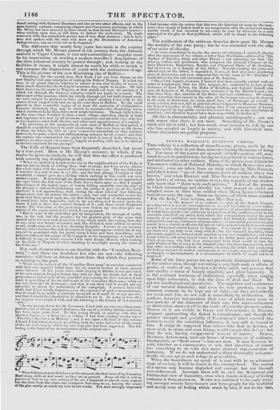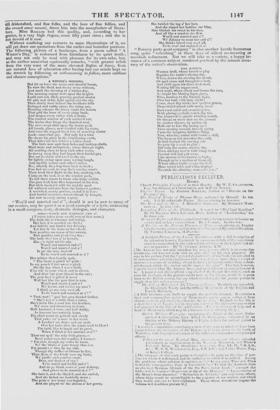JOANNA HAll,LIE'S FCC iTivr vEasEs.
Tuts volume is a collection of miscellaneous pieces, made by the poetess while there is yet time, none else having the means of doing it. For many of the poems are upwards of half a century old, scat- tered in various publications, having been rcprinted its mrions forms, and attributed to other authors. Sonic of the pieces were written for THOMSON'S edition of National Melodies, to which BraNs also con- tributed : some are taken from an early volume by Miss 13Ammu, published before " one of the eminent poets of modern times was known," and when Harlan:. and Miss SEAwAnn were the fashion- able bards; of whom, we venture to say, the majority of our readers only know that " there were such persoim." A few of' the poems, in which dirmonology and chivalry (or what passed as ueh) are mingled, seem to have been written when AloNK Luwis's German imitations were the rage. •Sonic are hymns ; of which those marked
" For the Kirk," were written, says Miss 13Aft.mg, * •
at i11,2 request of an eminent member of the Scotch Church, at a time when it was in contemplation to eie:ipile by authority a new collec. lion of It; mns and sacred poetry for the general use of parochial congregations. It would have gratified me extremely to have been of the smallest service to the venerable chureh of may native land, which the conscientious zeal or the great majority of an intelligent and virtuous nation lrol founded ; which their un- conquerable courage, endurance of persecution, at:a unwearied perseverance,had reared into a elturch as effective for pr i rate vita tie and ecclesiastical government as any Protestant establishment in Europe. I was proud to lie so occupied ; my heart and my duty went along with it : hut the General Ass,mbly when afterwards applied to, refused their sanction to any new compilation ; anh what I had written, and many sacred verses frG111 fin. better poets, proved abortive. That elergynien, who had been accost ()Med from thew youth to hear the noble 1's:it'll's of David sung by the mingled voices of a large congregation, swel- ling often to a sublime volume of' sound, elevatiag the ■nind and quickening the feelings beyond all studied excitements of art, :Ionia regard tiny additions or chatwes its presumptuous, is a circumstance at which we ought not to be
surprise'd." •
Some of the later poems are not peculiarly distinguished: many of the earlier ones' though not taking a very high rank as efforts of genius or works of art, betoken a healthy mind, and possess that rare quality a union of homely simplicity and plain humanity. It is the constant tendency of civilization, especially when verging upon high refinement, to sink the idea of ,fiesh awl blood. We get too intellectual and speculative. The appetites and weaknesses of our natural humanity, and even its very passions, SPCM by common consent to be kept out of sight,—as they undoubtedly arc weakened (we do not call it controlled) by civilization. As authors, however independent their cast of mind, must more or less partake of the character of their age, tins super-retinement or abstraction shows itself in the works of' even the greatest genius. Traces of' it are visible in GRAY MO CoLDSMITII; 1Coanns,
elegance approachinfr the finical is con a
conspicuous ; nd though the greater strength an d° geniality of CAMPBELL'S Mill(' eim it mled hint better to resist the enfeebling influence, it may still be traced in hint. It might be supposed that writers who deal in heroics, or more truly in crime and even felony, would escape this delbet : but
they do not, having exaggeration instead of nature. BynoN,
AINSWORTH, turn out heroes of romance, or or milliners, blackguards, (Sr " flash coves "—but not men. It may however be said, whether as a consequence or not, that ignorance of nature has something to do with this more abstract rept esentation of humanity. It' we do not understand a thing thoroughly and prac- tically, we are apt to seek refuge in generalities. When the homeliness we speak of is met with in an advanced stage of society, it will be found in the eountry-bred. The rustics of a nation may become degraded and corrupt, but not through over-refinement. Amongst them will be met the Scriptural and Patriarchal view of humanity, even when innate delicacy of feeling - restrains it from grossness. SCOTT WaR indebted to his early train- ing amongst remote farm-houses and thrm-people for the healthful arid manly tone of feeling which stuck by him, if not, to the last,
till Abbotsford, and fine folks, and the love of fine follies, and
the crescit amor nammi, drove him into the manufacture of litera- ture. Miss BAILLIE had this quality, and, according to her
genius, in a very high degree, some fifty years since ; and she is not devoid of it now.
Without confining our extracts to mere illustrations of it, we will yet draw our quotations from the earlier and homelier portions. The following picture of a landscape, from a poem called " A Winter's Day," is redeemed from literalness by its quiet truth ; and may not only be read with pleasure for its own sake, but, as the author somewhat equivocally remarks, "with greater relish from the very want of the more elevated flights of' fancy, from our natural love of relaxation after having had our minds kept on
the stretch by following, or endeavouring to follow, more sublime and obscure conceptions."
A WINTER'S MORNING.
But let us leave the warn: and cheerful house, To view the bleak and dreary scene without, And mark the dawning of a winter-day. The morning vapour rests upon the heights Lurid and red, while growing gradual shades Of pale and sickly light spread o'er the sky. Then slowly from behind the Southern lulls Enlarged and ruddy comes the rising sun, Shooting askance the hoary waste his beams, That gild the brow of every ridgy bank, And deepen every valley with a shade, The crusted window of each scatter'd cot, The icicles that fringe the thatched roof, The new-swept slide upon the frozen pool, All keenly glance, new with his rays; And even the rogged-faced face of scowling winter Looks somew hat gay. But only for a time Ile shows his glory to the l•rightelling earth, Then hides his face behind a sullen cloud.
The !Ards now quit their holes and lurking-sheds, Most mute and melancholy, where through night, All nestling close to keep each other warm, In downy slet p they had forgot their hardships; But not to chant and carol io the air, Or lightly swing upon some waving bough,
And merrily return each other's not,s. • No; silently they hop from bush to bush ; Can find no seeds to stop their craving want ; Then bend their Bight to the low, smoking cot, Chirp on the roof; or at the window peck, To tell their wants to those who lodge within. The poor lank hare flies homeward to his den, But little borden'd with his nightly meal Of wither'd colviorts from the farmer's garden;
A wretch n
wretched, scaty lion on
ti, sn h n ate'd ifear: And fearful creatures, forced abroad by hunger, Are now to every enemy a prey.
" Woo'd and married and a' ", should it not be new to many of our readers, may be quoted as a good example of' a lyric, embracing in a small compass, story, dramatic dialogue, and character.
sONG—WOo•D ANO MARRIED .1ND A'.
(Version taken .from on old SOIly of that name.)
The bride she is winsome and bonny, Her hair it is stimuded sae sleek; And faitlifte and kind is her 'Johnny, Yet fast fa' the tears on her check.
New pearl ins are cause itt Iler sorrow,
New pearlins and plenkhing too : The bride that has a' to borrow, Has e'n right mickle ado.
Woo'd and married and a'!
'4Voo'd and married and a':
Is na' she very wed alf
To be wou'd and married at a'?
Her mither then hastily slunk',
" The lassie is glakit wi' pride : In my pouch 1 had never a plack On the day when 1 was a bride.
E'en tali: to your wheel, and be clever, And draw mit your thread in the situ; The gear that is gifted it never Will last like the gear that is won.
Woo'd and !marl, d and a'!
havins and tocher sae sma' I think ye are verv wed aff, To be woe it and married at a'!"
it Toot, toot ! " quo' her grey-headed faither, " She's less o' a bride than a bairn, She's ta'en like a (mut frac the heather, Wi' sense and discretion to learn.
Half husband, I I row, and latif daddy,
As humour inconstantly leans,
The chiel intion be patient and steady
That yokes 111' a mate in her teens.
A kerchief sae donee and sae neat, O'er her locks that the winds used to blaw!
l'm bait Ii like to laugh and to greet, IV lieu I think o' her married at a' I" Then out spats' the wily bridegroom,— Weel waled n ere his wordies, 1 ;rem,— " l'm rich, though my coffer be toom, i' the blinks a' your bonny blue een. Ein prouder o' thee by my side, Though tlty ruffles or ribbons be few, Than Nate 0 the Croft were my bride, Wi' mulles and pearlins enow. Dear, and dearest of oily Ye're %you'd and buikit and a' !
And do ye think scorn o' your Johnny, And grieve to be married at a'? "
She tura'd, aunt she and she stalled, And she looket sae bashfully dowu ; The pride o' her heart was beguiled, And she played wi' the sleeves o' her gown
She twirled the tag o' her Ewe, And she nippet-her boddice sae blue,
Sine blinket sae sweet in his face, And aff like a maukin she flew.
'Woo'd and married and a' Wi' Johnny to roose her and e! She thinks 'terse' very weed aff, To be woo' and married at a'.
"Poverty parts good company" is also another keenly humorous song, quite "refreshing" in these days of stilted no-meaning or mawkish refinement. But we will take as a variety, a happy in- stance of a common subject rendered poetical by the minute accu- racy of the writer's observation.
THE RITTEN.
Wanton droll, whose harmless play Beguiles the rustic's closing day, When, drawn the evening fire about, Sit aged crone and thoughtless lout, „And child upon his three-foot stool, 'Waiting till his supper cool, And maid, whose cheek outldooms the rose, As bright the blazing fagot glows, Who, bending to the friendly light, Plies her task with busy slight', Come, show thy tricks and sportive graces, Thus circled rotund with merry faces.
'Backward coind and crouching low, With glaring eyeballs watch thy foe, The housewife's spindle whirling round, Or thread or straw that on the ground Its shadow throws, by urchin sly Held out to lure thy roving eye; Then stealing onward, fiercely spring 'Upon the tempting faithless thing. Now, wheeling round with bootless skill, Thy ho-peep tail provokes thee still, As still beyond thy curving side Its jetty tip is seen to glide ; Till from the centre starting far, TItou sidelong veer'st with runt') in air Erected stiff and gait awry, Like madam in her tantrums high ; Though neer a madam of them all, Whose silken kirtle sweeps the hall, More varied trick and whim displays To catch the admiring stranger's gaze."



























 Previous page
Previous page